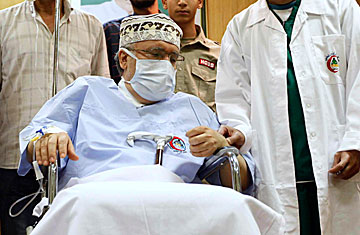
Abdel Basset Ali al-Megrahi sits in a wheelchair in his room at a hospital in Tripoli in this Sept. 9, 2009, file photo
Libya's rebel leaders settling into their new offices in Tripoli must surely be aware of the debt they owe NATO, whose more than 2,000 bombing raids were essential not just to crushing Muammar Gaddafi's 42-year rule but also to keeping the antiregime fighters alive through months of battle. Despite that, it became clear over the weekend that the new transitional government might not be an entirely compliant partner of the West.
Rebel leaders strengthened their control of the capital on Monday, Aug. 29, while fighters inched closer to the outskirts of Sirte, about 300 miles (480 km) east along the Mediterranean coast, where Gaddafi and his sons and aides are believed to have holed up. But even as NATO bombing continued, rebel leaders made it clear late Friday, Aug. 26, that they would reject a key request from British Prime Minister David Cameron — one of their strongest backers — to extradite those suspected of murdering British policewoman Yvonne Fletcher on a London street in 1984, as well as the dying Abdel Basset Ali al-Megrahi, who was convicted of bombing a Pan Am jet over Lockerbie, Scotland, in 1988, killing 270 people, most of them Americans. "We will not give any Libyan citizen to the West," the rebels' newly appointed Justice Minister Mohammed al-Alagi bluntly told reporters in Tripoli. "It was Gaddafi who handed over Libyan citizens." A member of the rebels' National Transitional Council (NTC), Libya's caretaker government, told the London Sunday Times that "Libya has never extradited or handed over its citizens to a foreign country."
That statement is not true. In reality, Gaddafi rewrote Libya's fortunes and his own by signing extradition orders for two Libyan citizens. In 1999 he sent al-Megrahi and another Libyan to the Netherlands to stand trial for mass murder in the Lockerbie bombing and paid $10 million to the family of each Lockerbie victim. Al-Megrahi was convicted and sentenced to 27 years in a Scottish prison. After years of defiance over the issue, Gaddafi's move helped end Libya's isolation from the West and paved the way to billions of dollars in Western investment in his country.
With Gaddafi defeated, al-Alagi's words were perhaps aimed at quieting Libyan fears that Western countries would now dictate their nation's political terms. It is unclear whether his statement spoke for the entire council. The organization's London representative, Guma al-Gamaty, told the Guardian newspaper that it might still be possible to have a trial in Britain of Fletcher's suspected murderers. "Nobody can rule anything out at the moment," he said.
Even so, the Justice Minister's refusal seemed to break assurances rebel leaders made to Britain just three months ago about what would happen if they took over Libya. British Foreign Secretary William Hague, referring the murder of Fletcher, told reporters Sunday night that "when [NTC chairman Mustafa Abdel] Jalil ... was with us in London in May, he committed himself and the council to cooperating fully with the British government on this issue." Fletcher was killed in February 1984 when someone inside the Libyan embassy in London fired on protesters outside the building. No one was arrested, and the embassy staff was allowed to leave freely with diplomatic immunity. For years, British officials have failed to persuade Gaddafi to pursue suspects — something the rebel leader Jalil apparently promised to do when he met with Hague in May. Back then, the rebels were in a drastically different situation, however. Jalil, Gaddafi's Justice Minister until he defected in February, had flown to London to plead for more money and equipment for the rebel forces, whose resources and energies were badly depleted from their vicious battle to keep the city of Misratah from falling to the regime.
The Lockerbie bomber al-Megrahi appeared to be dying on Sunday. CNN correspondent Nic Robertson described visiting the sprawling mansion in Tripoli that was built for him after a Scottish judge freed him in August 2009 on compassionate grounds, saying he had only three months to live. He had served just eight years of his 27-year sentence. CNN showed al-Megrahi seemingly unconscious, lying in a hospital bed connected to an oxygen tube.
Al-Megrahi's release came after long negotiations orchestrated by Gaddafi's son Saif al-Islam, who at the time was regarded as Gaddafi's heir apparent, heavily favored by Western leaders for his reformist program. The thunderous welcome in Tripoli for al-Megrahi as he stepped off an airplane hand in hand with Saif sealed the younger Gaddafi's role as Muammar's likely successor — and that remained so until the revolt erupted in February. "I worked very hard to get him out of jail," Saif told TIME in an interview last year. "I think it is one of my biggest achievements, personally."
The fact that al-Megrahi has lived far longer than the judge stated was likely has raised suspicions that a backroom deal was cut in which officials from Britain's previous Labour Party government would trade al-Megrahi for multibillion-dollar oil contracts. British officials long denied that, but Cameron has repeatedly stated that al-Megrahi's release was a mistake.
At least one relative of those killed in the Lockerbie bombing believes al-Megrahi should be allowed to die in peace at home. "Even if this man was as guilty as hell, the evidence did not show it beyond all reasonable doubt," said the Rev. John Mosey, whose 19-year-old daughter died in the attack, and who sat through the 36-week Lockerbie trial. He told TIME on Monday he believed Western leaders might ultimately regret ousting Gaddafi, who had in recent years abandoned his old enmity. "Gaddafi handed over two men for trial, paid out enormous compensation, helped to give information regarding other terrorist groups, and what do we do in exchange? We bomb his country," he said. "I think the West will regret NATO's involvement."
